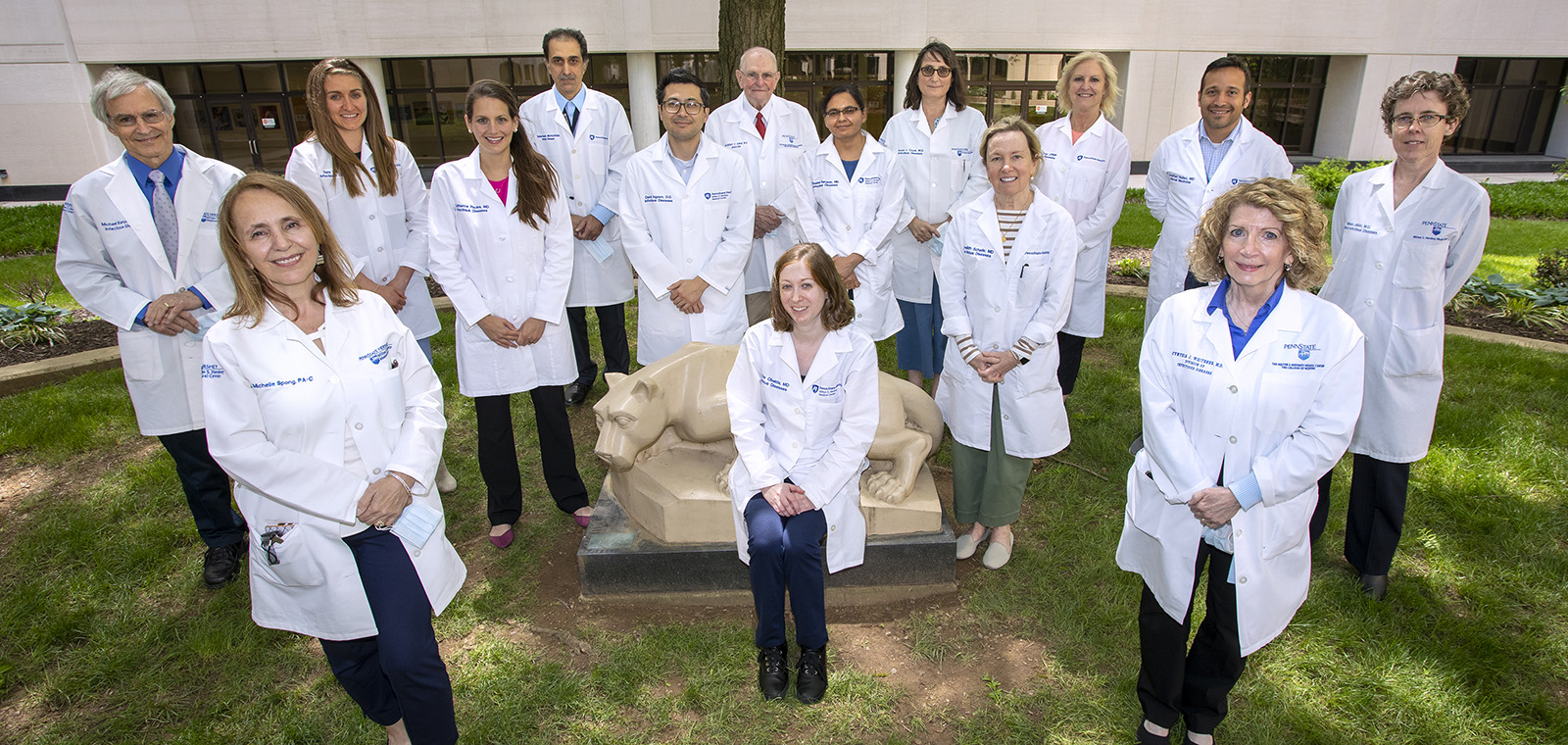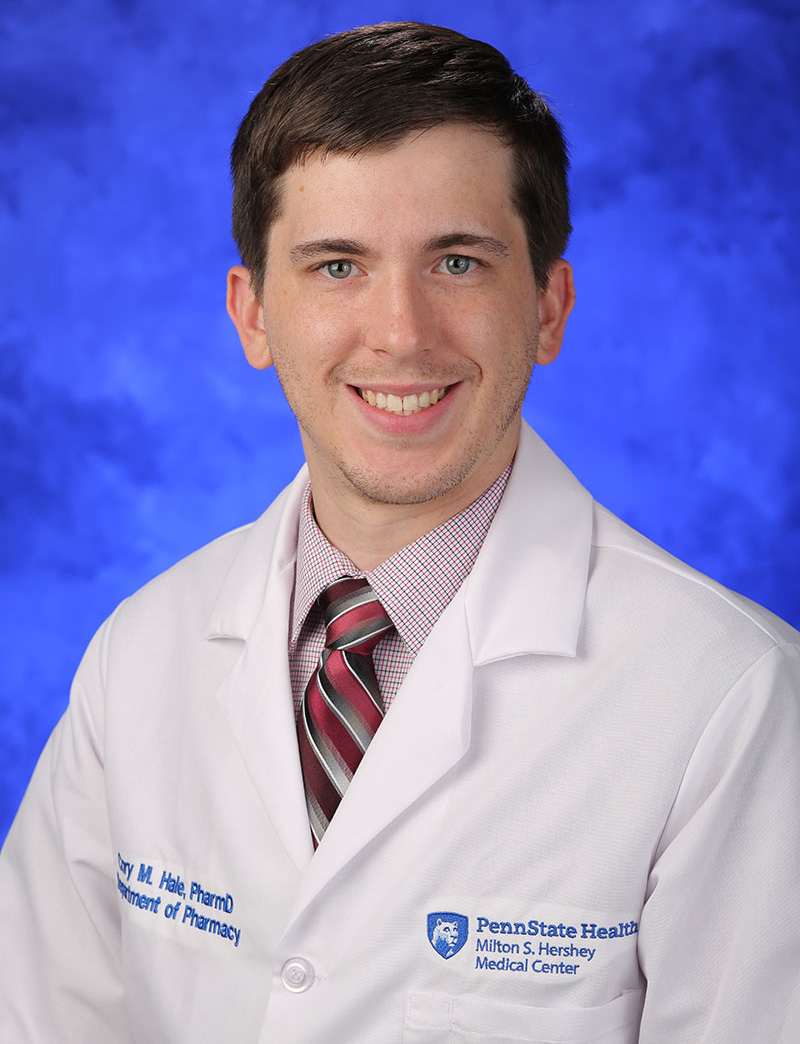Infectious Diseases - Other Institutional Roles

Other Institutional Roles
Antimicrobial Stewardship Program
Penn State Health Milton S. Hershey Medical Center’s Antimicrobial Stewardship Program (ASP) is a quality initiative that began in 2011, after extensive discussions with clinicians and endorsement by the Penn State College of Medicine dean and Medical Staff Executive Committee (including the chairs of all clinical departments). The primary goals of the ASP are to improve the care of individual patients and to limit the rates of resistant bacteria and Clostridioides difficile.
Each year, Adult and Pediatric ASPs (the latter began in 2014) work to optimize antibiotic usage for thousands of patients through the review of computer-generated alerts, daily ASP rounds and many other activities. In 2018, with the support of hospital administration and clinicians, Penn State College of Medicine was one of the first 25 institutions in the country to be named an Antimicrobial Stewardship Center of Excellence by the Infectious Diseases Society of America, a designation that was renewed at the end of 2020.
Team Leadership

Michael Katzman, MD, is Director of the Antimicrobial Stewardship Program.

Cory M. Hale, PharmD, BCPS, BCIDP, is Co-Director of the Antimicrobial Stewardship Program.
Bio-preparedness
Preparedness for infectious diseases outbreaks is a key goal of the Division of Infectious Diseases and Epidemiology. In response to the 2014-2016 Ebola outbreak in West Africa, which led to multiple cases of Ebola in the United States, Penn State Health Milton S. Hershey Medical Center started an interdisciplinary training effort between both clinical and non-clinical staff and the infectious diseases team in collaboration with the Emergency Management and Business Continuity Department. Designation as an Ebola Treatment Center was received in January 2015 after evaluations by the Centers for Disease Control and Prevention and the Pennsylvania Department of Health. The institution received a 5-year grant to help jump-start the program and Penn State Health has continued to invest in the program beyond the grant, including major construction projects designed to provide isolation spaces for patients with highly contagious infectious diseases. As part of this effort, a “Special Pathogens Team” was formed to assist in the event of a patient suspected of or identified as having a highly infectious disease. This team was integral in leading the institutional responses to the COVID-19 pandemic and continues to prepare for future outbreaks.
Team Leadership
Employee Health
The Division of Infectious Diseases and Epidemiology is committed to providing support for Penn State Health employees through leadership roles in employee health. Two infectious diseases faculty serve as medical directors for Employee Health: Rezhan Hussein, MD, and Rashmi Banjade, MD. Robert Aber, MD, also played a key role as an interim medical director during the height of the COVID-19 pandemic. The division has been responsible for reviewing and updating Employee Health protocols to ensure they reflect national recommendations and any updated primary literature. In addition, in collaboration with an Employee Health advanced practice provider and Employee Health nurses, the division oversees advice given to employees about vaccination, exposures to tuberculosis and after needlestick injuries, and clearance for mask fit testing in certain cases. Particularly during the first two years of the COVID-19 pandemic, the division supported Employee Health efforts to ensure availability of rapid and reliable COVID-19 testing, helped to develop quarantine and isolation policies, and assisted with processes for access to vaccines and therapeutics. These efforts have been critical for employees’ safety and health.
Team Leadership
Hospital Epidemiology and Infection Prevention
The concentration of those people most vulnerable to infection from the communities that the division serves is greatest within the walls of Penn State Health hospitals. The team of Penn State Health hospital epidemiologists and infection preventionists includes longtime advocates for patient and employee safety in this unique setting. Collaborations are sought with staff and clinical and administrative leadership to identify opportunities to reduce risk of infections. For example, infection preventionists have supported the development of protocols to discontinue invasive catheters when no longer essential to medical care, to improve disinfection of multi-use medical equipment, and to administer decolonization treatments for the purpose of decreasing the burden of MRSA and other pathogens. Infection preventionists regularly conduct surveillance for hospital-acquired infections and investigate signals that may indicate outbreaks (e.g., of COVID-19) or emergence of highly drug-resistant pathogens (e.g., metallo-beta-lactamase-producing E. coli). Hospital epidemiologists are strongly supportive of studies by medical trainees and infection preventionists to document investigations of outbreaks, analyze the burden of hospital-acquired infections, and assess infection prevention interventions.
Team Leadership






